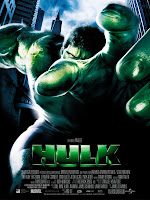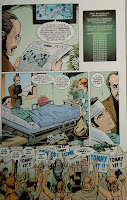Sergeant Nate Slaughterhouse is a veteran of the Space Corps. He fought on hostile planets and delivered dozens of fighting, until one day, seriously injured, it is recovered half dead on the battlefield. Placed in cryogenic suspension, he owes his life as cybernetic implants that now constitute the bulk of his body.
The psychological shock is intense. Demobilized from Nate, with his wife and son for Mega-City One. Here, the family found an apartment block in a filthy, plagued by crime. They are short of money, without jobs, without any psychological help. Slaughterhouse thought to have lived through difficult times, but it's hell in the megalopolis that is going to know the worst. And when he finally has nothing to lose, he will do what he always does: killing.
Unfortunately for this brave victim of such circumstances, the law in Mega-City One, is made by the Judges. Dredd, who took a liking to a veteran, if indeed he might feel in will find himself obliged to hunt him down.
They should have the same side, life has decided otherwise ...
branch U.S. Comics Sun is not at his first attempt on the famous Judge Dredd, from the equally famous British weekly 2000 AD. Last year, the publisher had already published a collection of short stories, whose content and assorted looks very particular could just discard it.
Here, these reserves are not expected to be as it is one long story  , written by John Wagner and illustrated by Kev Walker (who officiated at Marvel Zombies ), Simon Coleby and Carl Critchlow . Graphically, the result is efficient, especially for the first part (in fact this volume contains two different arcs forming a whole), with a style and dark shadows and contrasts that are able to transcribe both the violence of the city's destruction of its inhabitants. The second part is more conventional and less inspired but still quite honest.
, written by John Wagner and illustrated by Kev Walker (who officiated at Marvel Zombies ), Simon Coleby and Carl Critchlow . Graphically, the result is efficient, especially for the first part (in fact this volume contains two different arcs forming a whole), with a style and dark shadows and contrasts that are able to transcribe both the violence of the city's destruction of its inhabitants. The second part is more conventional and less inspired but still quite honest.
 , written by John Wagner and illustrated by Kev Walker (who officiated at Marvel Zombies ), Simon Coleby and Carl Critchlow . Graphically, the result is efficient, especially for the first part (in fact this volume contains two different arcs forming a whole), with a style and dark shadows and contrasts that are able to transcribe both the violence of the city's destruction of its inhabitants. The second part is more conventional and less inspired but still quite honest.
, written by John Wagner and illustrated by Kev Walker (who officiated at Marvel Zombies ), Simon Coleby and Carl Critchlow . Graphically, the result is efficient, especially for the first part (in fact this volume contains two different arcs forming a whole), with a style and dark shadows and contrasts that are able to transcribe both the violence of the city's destruction of its inhabitants. The second part is more conventional and less inspired but still quite honest. The story is particularly harsh and uncompromising, the events occurring with a cold logic that enhances the horror and inevitability. Especially, Dredd must face here, not a monster or a hardened criminal but a man who fundamentally good, in desperation, will depart from the Act only reference to a judge who will nevertheless be a little less cynical than usual (initially at least). What could have been a banal story of revenge is finally enhanced by a moral questioning interesting and, above all, a relentless increase dramatically, giving the impression that the characters can only undergo a crushing and inhuman consequences.
You'll understand that it is not very gay. The book reveals disturbing, muscular without being simplistic and sometimes even moving. It also has the advantage of presenting the world of Dredd (based combat armor, blocks glaucous also immense and strong sense of desolation) in a coherent and accessible.
Technically, nothing special to report. T good, hardcover and (very) small gallery of covers.
From SF brutal and scary.
To avoid night of blues.
ps: I take this opportunity to let you change the address of the site Watchtower now Hosted by: http://wtcomics.mdata.fr/












